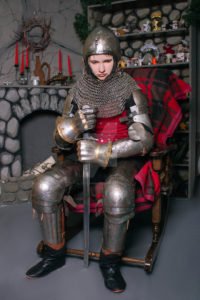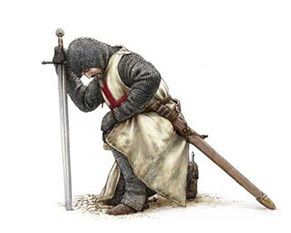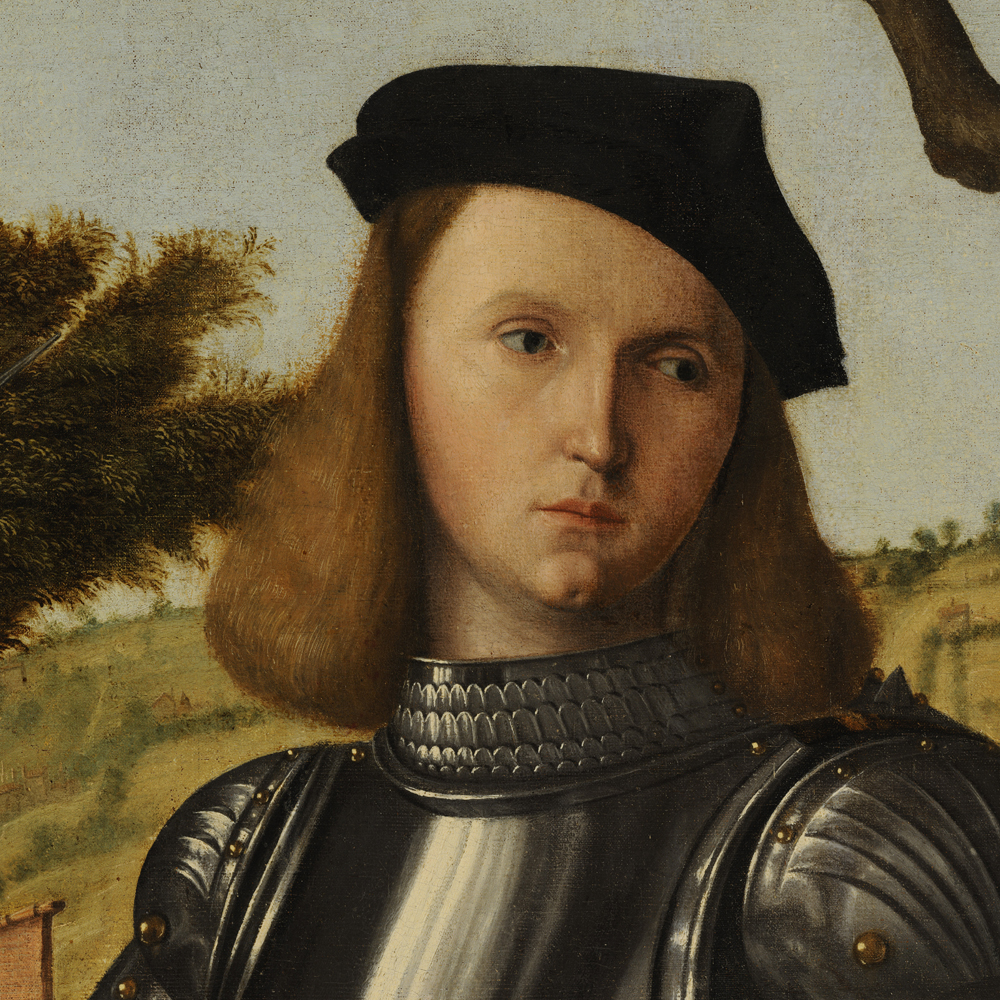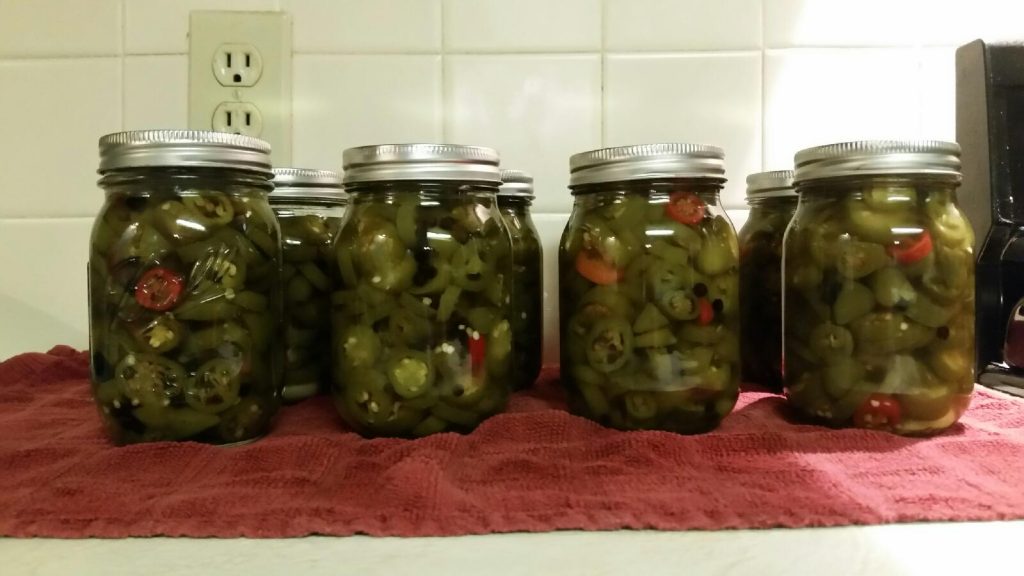Editor’s Note: We share another from Hoosier Hillbilly. This is also taken from The Gesta Romanorum.
Of a Young Knight who had Three Friends
Domician reigned, a wise Emperor in the city of Rome, and in his empire was a noble knight, who had only one son whom he greatly loved. On a time this son came to him and said, “Father, I am a young man; truly, if it be your will, I wish to go about to castles and kingdoms, and gain friends for myself, so that I may, when ye go hence out of this world, have knowledge.
“Yes,” said the father, “well shall it please me, so that thou dost show me when thou comest again, what friends thou hast obtained.”
Then said he, “Yes father, thy will in that case shall be fulfilled.”
The young man traveled through certain kingdoms, countries, and cities; and at the end of three years he came home to his father. And the  father was highly rejoiced by his presence and said, “Son, how sayest thou? Hast thou won any friends?”
father was highly rejoiced by his presence and said, “Son, how sayest thou? Hast thou won any friends?”
“Yea, sir,” he said, “I have found three friends since I went forth; and the first friend I love more than myself, and therefore would I for his love shed my blood, if need were; the second I love as much as myself; but the third I love little, in comparison with the others.”
Then said the father, “Son, has thou proved any of these three friends?”
“Nay, sir,” quoth he.
Then quoth the father, “So after my counsel and it shell please thee. Do, and slay a swine and put it in a sack; and at midnight go to thy first friend and say to him, ‘Dear friend, help me now in my great need, for through mischance I have slain a man, and he is here upon my back in a sack’; and then thou shalt see what thy friend will say to thee. After that, go to thy second friend, and so to the third; and write all their answers in thy heart.”
The son went, as the father said to him; and at midnight he came to the gate of the first friend, whom he loved more than himself, and knocked at his gate. Anon as his friend heard him knock, he rose and let him in, and said, “Friend, thou art welcome.”
“Ah, friend,” quoth that other, “I am come to thee in my great need, for I love thy body more than myself, and therefore succor me in this misfortune; for I have though mishap slain a man, and he is here upon my back in a sack; and therefore, I pray thee, that thou wilt hide him and conceal the body of this dead man in some secret place in thy house, for if the body be found with me, doubtless I must be hanged for him.”
“Yea,” quoth the other, “though thou wert my father, I would not do that for thee; for since thou hast slain the man, thou art worthy to be damned for him. Nevertheless, because of the great friendship that hath been between us heretofore for a long time, I shall give thee two ells of linen cloth, for to wrap or to cover thy body, when thou art hanged.”
Then the young man went to that other friend whom he loved as much as himself, and knocked at his gate. Anon when he heard the knocking, he rose and opened the door, and kissed him, and worshipfully received him. Then spake the young man, and said “Ah! Good friend, help me now in my greatest need that I ever had. I have through misfortune slain a man and he is here with me, and therefore, for all the friendship that is between thee and me, lay him in some secret place of thy house; for if he be found with me, I am but dead.”
“Nay,” quoth that other, “that thou canst not make me do. Bear him hence, and make thee merry with him. Why didst thou slay him? But yet, friend, I shall tell thee, I will not have ado with him; but for the great love that hath been between us two, I will go with thee to the gibbet; and afterwards will get me another friend.”
The young man was heavy at these words; and he went to another friend, the one that he loved but little, and knocked at his gate. He rose up, as soon as he heard his voice, and let him in and kissed him and said, “Friend, who art half my soul, welcome be thou to me!”
Then said the other, “Truly, I am ashamed to speak with thee, for I have done little for thee, or else nothing, in all my life; and therefore with great shame I show thee mine errand.”
“Yea, surely,” said the other, “show me what thou wilt.”
“Forsooth,” quoth the other, “I have unhappily slain a man, and here I bear his body on my back, and therefore I pray thee, help me in this great need, and if ye will hide the body in your house, ye might not do me a better turn, for if it be found with me, I am but dead.”
“Nay,” quoth that other, “I will not hide the body, but I will die for thee tomorrow on the gibbet; and therefore, I pray thee, love thou never friend so well as me after my death, but if he will die for thee, as I shall.”
When the young man heard him say thus, he fell down on his knees, and prayed him that he would forgive him that he had loved the other two friends so much and him so little or not at all. “And therefore from henceforward I shall never love myself so much as thee.”
The other took him by the neck and kissed him; and he went home, and told his father how it was with the three friends.
Morality
Good men, this Emperor is the Father of Heaven, by the knight understand prelates of the Holy Church; by the son is understood every Christian man. And so do many of us get us friends, but they fail us in our need; and therefore saith the wise man, Est amicus meus, et non permanebit in tempore necessitatis. This is to say, “There is a friend at the table, which will not abide in time of need.”
The first friend, that thou lovest more than thyself, is this world; for we see every day that men will for the world and worldly thing to be had, put themselves in perils of the sea, in perils of battle, and of damnation. And therefore it is well proved that they love more the world than themselves, but in time of need, when the soul shall pass from the body, after the will of God, and that the body be given to worms, then the world, that thou lovest so much, shall fail thee; in so much that if thou have two ells of linen cloth, to wrap thy body in, it is a great thing.
 The second friend, that thou lovest as much as thyself, is thy wife and children, the which in time of death will go with thee to the sepulcher, and weep a little for thee, but then thou art in the earth, they go home and consider whom they may have in thy stead.
The second friend, that thou lovest as much as thyself, is thy wife and children, the which in time of death will go with thee to the sepulcher, and weep a little for thee, but then thou art in the earth, they go home and consider whom they may have in thy stead.
The third friend, that thou lovest so little, is our Lord, Jesus Christ, for it thou come to Him with a clean heart, in time of thy need, He will not fail thee; and therefore it is said, In quacumque hore a peccator ingemuerit, salvus erit. This is to say, “In what hour the sinner waileth, he shall be saved.” And therefore when the sinner deserved by his wickedness everlasting death, then Christ, God’s son, came and took death for him on the gibbet of the cross.
And therefore, sirs, let us bow our knees, and ask mercy of Him that we pleased these other two so much and Him so little, who is an unchangeable friend, a noble friend, and a mighty friend. Now pray we Him earnestly to be our friend, whose friendship never faileth, Qui cum patre et spiritu sancto omnia regit secula. Amen.









